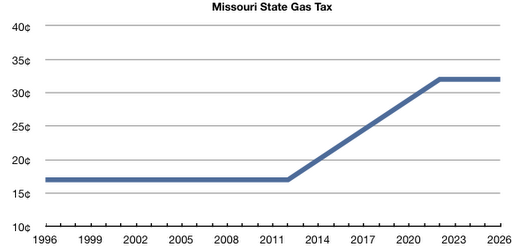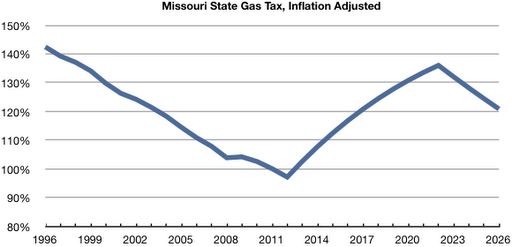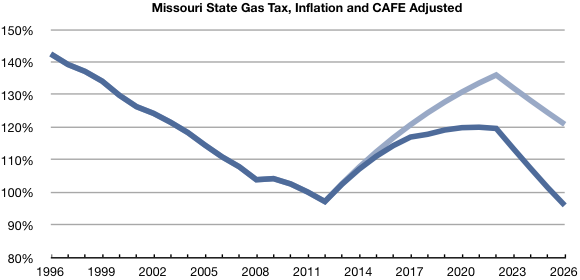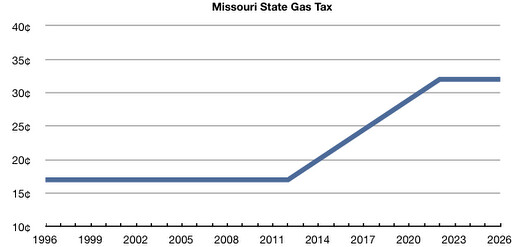MoDOT recently came forward with some ideas on how it might pay for the $1.5-4 billion project to rebuild and widen I-70 between Kansas City and St. Louis. The two options they proposed included 1) a 15¢ increase in the state gas tax over ten years, 2) tolling I-70, or both. For purposes of this post, let's focus on just the gas tax option. While I wrote about the declining value of the state gas tax a little over a month ago, MoDOT's proposal will allow us to go into a little more detail.
Missouri's state gas tax currently stands at 17¢ a gallon and has not changed since 1996. Let's assume that the proposed gas tax increase first takes effect in 2013. Over the next 9 years, the state gas tax will almost double to 32¢. Assuming the status quo for other states, the new rate would place Missouri 16th, between Oregon and West Virginia.

However, as shown below, the picture looks much different when adjusting the value of the gas tax for inflation.

In 1996, the state gas tax was worth 40% more than what its worth today. And despite MoDOT's proposal to nearly double the gas tax, the 10 year timeframe means that inflation will keep the gas tax from ever reaching the value it had in 1996.
Inflation, however, is but one of the major value depressors of the state gas tax. The other major depressor is the looming increase in CAFE standards. Per legislation signed by President Obama last July, the average fuel economy for cars and light-duty trucks is set to double from 27.5 mpg in 2008 to 54.5 mpg in 2025.
The effect is that in the near future, drivers will be purchasing significantly less gas and, consequently, paying significantly less in fuel taxes under existing law. The chart below shows the significance of rising CAFE standards on the value of the state gas tax.

Inflation and rising CAFE standards mean that there is a finite amount of money MoDOT can hope to raise from a one-time increase in the gas tax above and beyond the revenue it currently earns. In 2011, revenue from the state gas tax was $502 million. Accounting for inflation, a 15¢ increase in the gas tax would net MoDOT an additional $1.85 billion (2011) in total additional revenue. With help from the federal government, MoDOT could parlay that into $9.25 billion.
When accounting for increasing CAFE standards, however, a 15¢ gas tax increase will net just $840 million (2011) in total additional revenue. MoDOT can parlay this money into almost $4.2 billion with help of the federal government. Consequently, a 15¢ gas tax by itself is only just enough to fund MoDOT's dream of I-70 truck only lanes from Kansas City to St. Louis. But, without additional sources of funding such as tolling revenue (or another major gas tax increase), MoDOT will be unable to invest in any other major projects for a long time to come.


